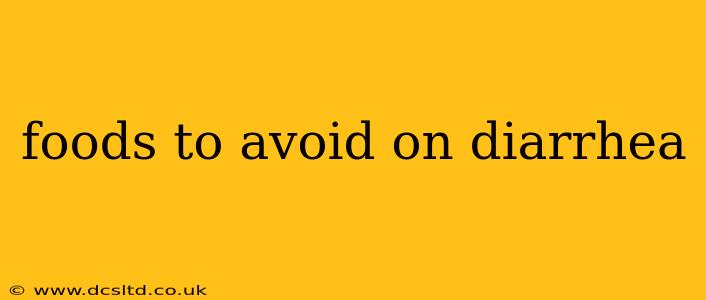Diarrhea, characterized by loose, watery stools, can be incredibly uncomfortable and debilitating. While it often resolves on its own, knowing which foods to avoid can significantly ease symptoms and help your body recover faster. This guide will outline the foods to steer clear of during a bout of diarrhea, answering common questions along the way.
What Foods Should I Avoid With Diarrhea?
Many foods can worsen diarrhea due to their high fat content, sugar content, or difficulty in digestion. Here's a breakdown of the common culprits:
-
High-Fat Foods: Fatty foods are notoriously difficult to digest when your digestive system is already upset. This includes fried foods, greasy meats, processed snacks, full-fat dairy products, and rich sauces. The extra fat can stimulate bowel movements, leading to more diarrhea.
-
Spicy Foods: Spicy foods can irritate the already inflamed lining of your intestines, worsening diarrhea and causing abdominal cramps. This includes chili peppers, hot sauces, and heavily spiced dishes.
-
Sugary Foods and Drinks: Sugary drinks and processed foods often contain high fructose corn syrup or other artificial sweeteners that can further disrupt the delicate balance of your gut flora and worsen diarrhea. Limit sugary sodas, candy, desserts, and fruit juices.
-
Dairy Products: Lactose intolerance, a common condition, can cause diarrhea. Even if you typically tolerate dairy, your body may be less able to process it while experiencing diarrhea. Consider temporarily avoiding milk, cheese, ice cream, and yogurt. Note: Lactose-free alternatives can often be tolerated.
-
Caffeinated Drinks: Caffeine acts as a stimulant and can increase bowel movements. This can exacerbate diarrhea, leading to dehydration. Limit or avoid coffee, tea, and caffeinated sodas.
-
Alcohol: Alcohol can irritate the digestive system and dehydrate you, making diarrhea worse. It's best to avoid alcohol until your symptoms subside.
-
Processed Foods: Many processed foods are high in fat, sugar, or artificial ingredients, all of which can aggravate diarrhea. Opt for whole, unprocessed foods during recovery.
What About Fruits? Are There Fruits to Avoid When You Have Diarrhea?
While many fruits are beneficial for their fiber content, some are best avoided during diarrhea. High-fiber fruits, while generally healthy, can cause more bowel movements when your system is already sensitive. This includes:
-
High-Fiber Fruits: Fruits like apples (with skin), pears (with skin), berries, and prunes are rich in fiber. While typically beneficial, the high fiber content can be problematic during an episode of diarrhea. Consider peeling fruits or opting for low-fiber alternatives.
-
Fruits High in Fructose: Fruits high in fructose, such as pears, apples, and mangoes, can worsen diarrhea due to the sugar content.
What Drinks Should I Avoid?
In addition to caffeinated and alcoholic beverages, it's important to avoid anything that could further dehydrate you, like sugary sodas and excessive fruit juice.
Are There Certain Vegetables to Avoid?
Generally, raw vegetables are harder to digest when experiencing diarrhea due to their higher fiber content. Cooked vegetables are usually better tolerated.
How Long Should I Avoid These Foods?
The duration of avoiding these foods depends on the severity and duration of your diarrhea. Once your symptoms improve significantly (less frequent, less watery stools) you can gradually reintroduce foods, starting with bland, easily digestible options. If your diarrhea persists for more than a few days or is accompanied by other symptoms (fever, severe abdominal pain, blood in stool), consult a healthcare professional immediately.
What Foods Should I Eat When I Have Diarrhea?
Focus on foods that are easy to digest and help replenish electrolytes lost through diarrhea. These include plain rice, toast, bananas, broth, and boiled potatoes.
This information is for general knowledge and does not constitute medical advice. Always consult with a healthcare professional for diagnosis and treatment of any medical condition, including diarrhea. They can help determine the underlying cause and provide personalized recommendations.
